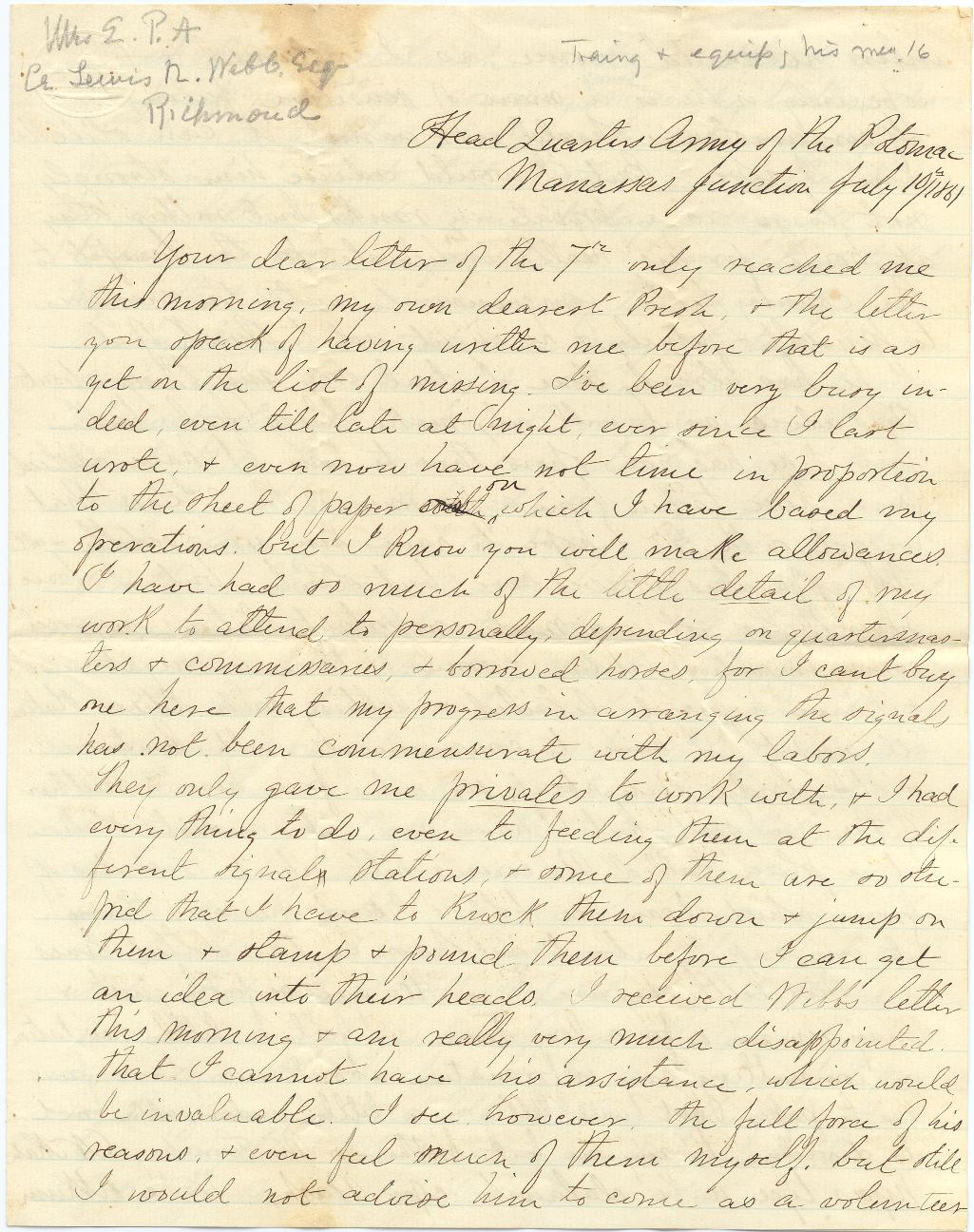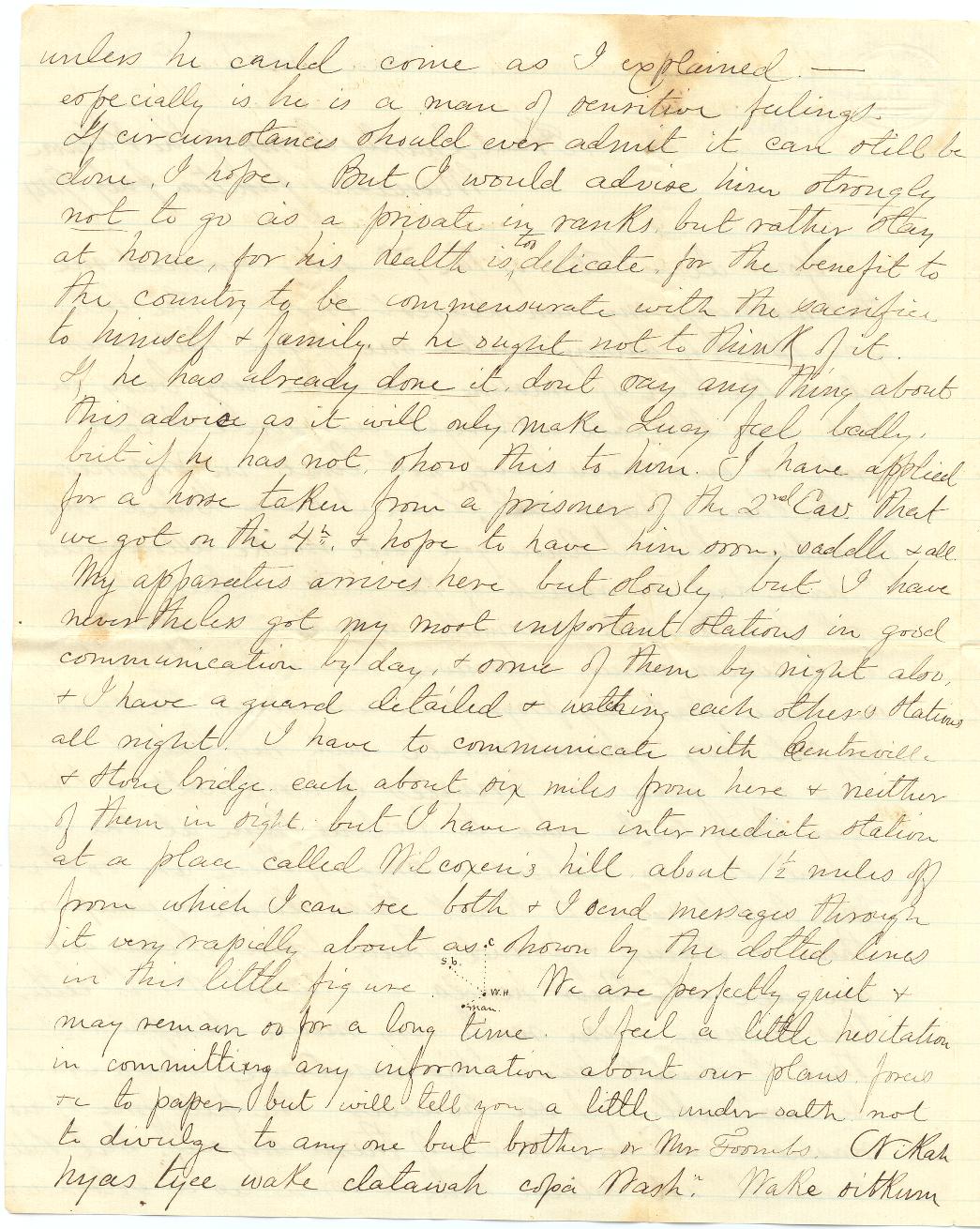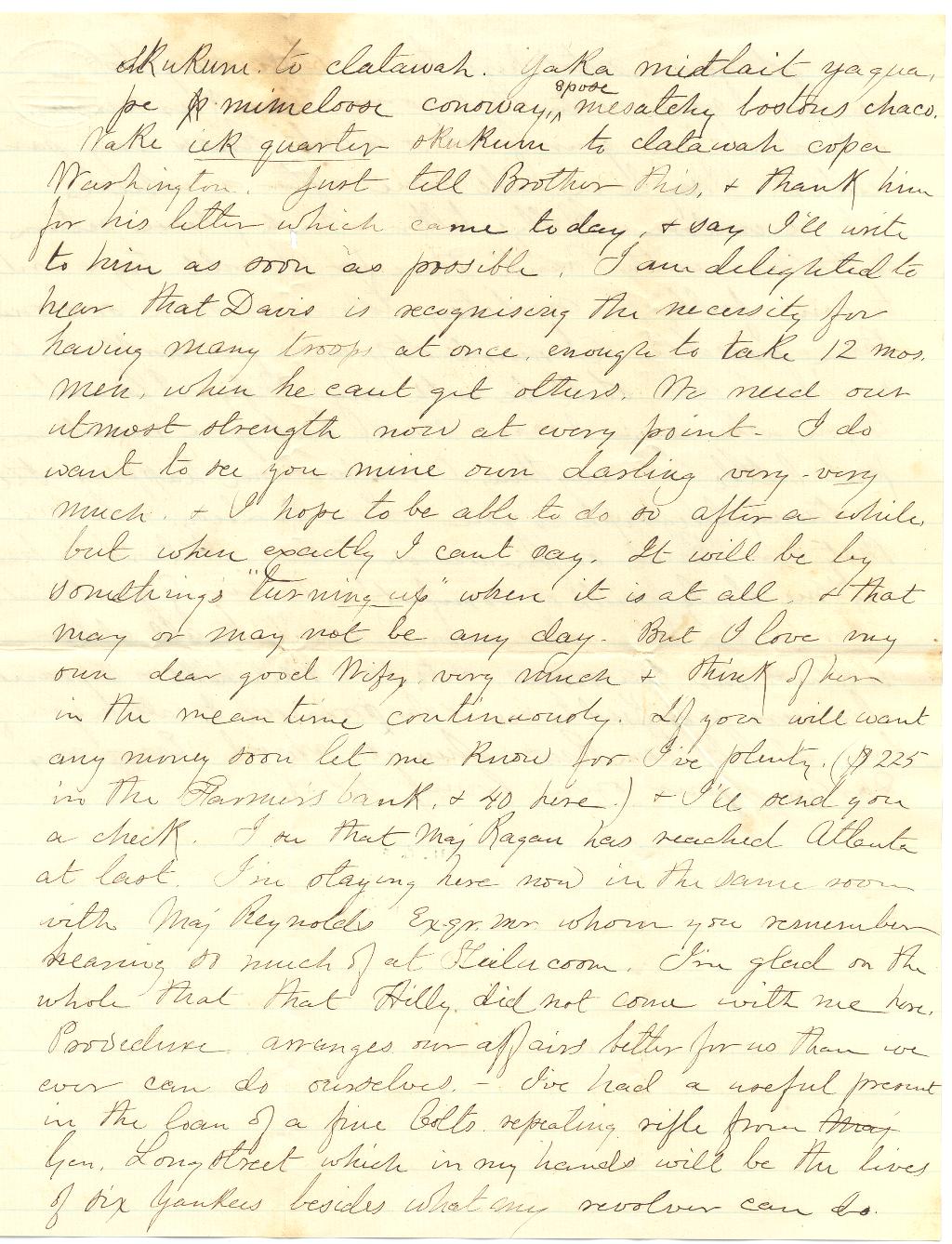Item description: Letter, 10 July 1861, from Edward Porter Alexander to his wife Bettie.
[Item transcription available below images.]
Item citation: From folder 8 of the Edward Porter Alexander Papers, #7, Southern Historical Collection, The Wilson Library, University of North Carolina at Chapel Hill.
Item transcription:
Head Quarters Army of the Potomac
Manassas Junction July 10/1861
Your dear letter of the 7th only reached me this morning, my own dearest Presh, and the letter you speak of having written me before that is as yet on the list of missing. I’ve been very busy indeed, even till late at night, ever since I last wrote, and even now have not time in proportion to the sheet of paper on which I have based my operations, but I know you will make allowances. I have had so much of the little detail of my work to attend to personally, depending on quartermasters and commissaries, and borrowed hordes, for I can’t buy one here that my progress in arranging the signals has not been commensurate with my labors. They only gave me privates to work with, and I had every thing to do, even to feeding them at the different signal stations, and some of them are so stupid that I have to knock them down and jump on them and stamp and pound them before I can get an idea into their heads. I received Webb’s letter this morning and am really very much disappointed that I cannot have his assistance, which would be invaluable. I see, however, the full force of his reasons, and even feel much of them myself, but still I would not advise him to come as a volunteer unless he could come as I explained–especially is he is a man of sensitive feelings. If circumstances should ever admit it can still be done, I hope. But I would advise him strongly not to go as a private in ranks but rather stay at home, for his health is too delicate for the benefit to the country to be commensurate with the sacrifice to himself and family and he ought not to think of it. If he has already done it, don’t say any thing about this advice as it will only make Lucy feel badly, but if he has not, show this to him. I have applied for a horse taken from a prisoner of the 2nd Cav. that we got on the 4th and hope to have him soon, saddle and all. My apparatus arrives here but slowly, but I have nevertheless got my most important stations in good communication by day, and some of them by night also, and I have a guard detailed to watching each others stations all night. I have to communicate with Centreville and Stonebridge each about six miles from here and neither of them in sight but I have an intermediate station at a place called Milcoxen’s hill, about 1 1/2 miles off from which I can see both and I send messages through it very rapidly about as shown by the dotted lines in this little figure [diagram]. We are perfectly quiet and may remain so for a long time. I feel a little hesitation in committing any information about our plans, forces to paper, but I will tell you a little under oath not to divulge to any one but brother or Mr. Founds. N kah hyas tyee wake clatawah copa nash. Wake sibkum skukum to clatawah. Yaka midlait yagwa, pe mimeloose conoway spose mesately bootons chaco. Wake uk quarter okukum to clatawah coper Washington. Just tell Brother this, and thank him for his letter which came today, and say I’ll write to him as soon as possible. I am delighted to hear that Davis is recognizing the necessity for having many troops at once, enough to take 12 mos. more, when he can’t get others. We need our utmost strength now at every point. I do want to see you mine own darling very very much and hope to be able to do so after a while, but when exactly I can’t say. It will be by something’s “turning up” where it is at all and that may or may not be any day. But I love my own dear good wifey very much and think of her in the meantime continuously. If you will want any money soon let me know for I’ve plenty ($225 in the Farmer’s bank, and 40 here) and I’ll send you a check. I see that Maj. Ragan has reached Atlanta at last. I’m staying here now in the same room with Maj. Reynolds Ex.qr.mr whom you remember hearing so much of at [?]. I’m glad on the whole that that filly did not come with me here. Providence arranges our affairs better for us than we ever can do ourselves–I’ve had a useful present in the loan of a fine Colts repeating rifle from Gen. Longstreet which in my hands will be the lives of six Yankees besides what my revolver can do. I’ve got your pistol here too. I’m sorry to see from your letter that your trunk is missing. I did not get your first and don’t know any particulars. May be it will come after a while.
I re-enclose Willy’s letter, which please return to Brother with thanks there for I will try to write to him fully on military topics as soon, or sooner, than possible. I must stop now for work, but my heart will still be with my wifey. I’ll write to you whenever I can Presh, but you must expect little. If anything of importance happens I’ll certainly telegraph to you. Love to Lucy, to tell her that her kind [provision?] of my [?] is bearing me daily fruits of comfort and to her of gratitude. Remember me too very specially to all at Mr. Webb’s and Mr. Harrisons, and to the Mitchell’s and Pegrams who were very kind to me, and who promised to call on you, if Lucy will let them know when you arrived. Ever my Darling your own loving Ed.






We have been trying to translate Alexander’s coded message, which appears to be written in “Chinook jargon”. As we understand it, Chinook words often have several meanings that are dependent on the context of the sentence. Using several resources, we have produced the following very very rough translation. Note that each word is presented on a new line and that the first word is the Chinook word followed by the English “options” within brackets.
Can anyone assist us with a translation? Any guesses as to the meaning of the message?
***
N
kah [where/when/what/that]
hyas [great/mighty/large/auspicious/powerful/very]
tyee [leader–hyas tyee=king (president?)]
wake [no]
clatawah [to go]
copa [to/in/at/with/by/upon/up from/toward]
nash.
Wake [No]
sibkum [half/part of?]
skukum [strong/big/mighty/true/genuine/solid]
to
clatawah [to go].
Yaka [he/she/him/her/his/hers/they]
midlait [to be?? To remain??]
yagwa [here],
pe [and/if/but/then/than/used for forming teen numbers]
mimeloose [dead/kill?]
conoway [all?]
spose [if/what if]
mesatehy (mesachie?) [bad/evil]
bostons [Yankees??]
chaco [come/to come].
Wake [No]
Uk/ick
quarter
okukum [this/that?]
to
clatawah [to go]
coper [form of to??]
Washington.
I am neither a great linguist, nor a Civil War historian. But I followed the same procedure that you describe, and this is what I come up with. I think that Alexander is expressing an opinion, in code to his brother, that might not be seen as altogether patriotic in Virginia in 1861. He is suggesting that Davis would be wise to leave Richmond. The first three sentences:
“Why does the big chief (Davis) not withdraw in the direction of Nashville? It is not cowardly to escape. He remains at the center of things but may lose all if the evil Americans come.”
And a bit closer to the original: [The initial “N” indicates a question] “Whence does the big chief [Hyas tyee] not escape towards Nash[ville]? It does not reduce (halve, quarter) the spirit to escape. [I think that Alexander is using “to” in order to indicate an infinitive form]. He remains in the belly, but may lose all if the the wicked Bostons come.”
The fourth phrase is more difficult. Does “quarter” follow the meaning of “Kwahta”? In context it could be an english word–a reference to what is done to prisoners in wartime. Could “coper” be “Kopet”? And what is the meaning of “Uk”? “Okoke” = “Okukum”? So here is an educated guess:
“No quarter unless far enough away from Washington.”
Thank you so much, Mr. Conboy, for sharing your translation!
Upon closer inspection, I think “nash” is actually “Wash.” as in, Washington. Therefore the first phrase should read, N kah hyas tyee wake clatawah copa Wash.
Yes, I agree. Close examination of the cursive supports the idea that “Nash” is really “Wash”. “Copa” (kopa) can mean “towards, in the direction of”, but can also convey “concerning, related to”. So this phase might be interpreted as “Whence the big chief not [withdraw, flee, escape] with regards to Washington?”